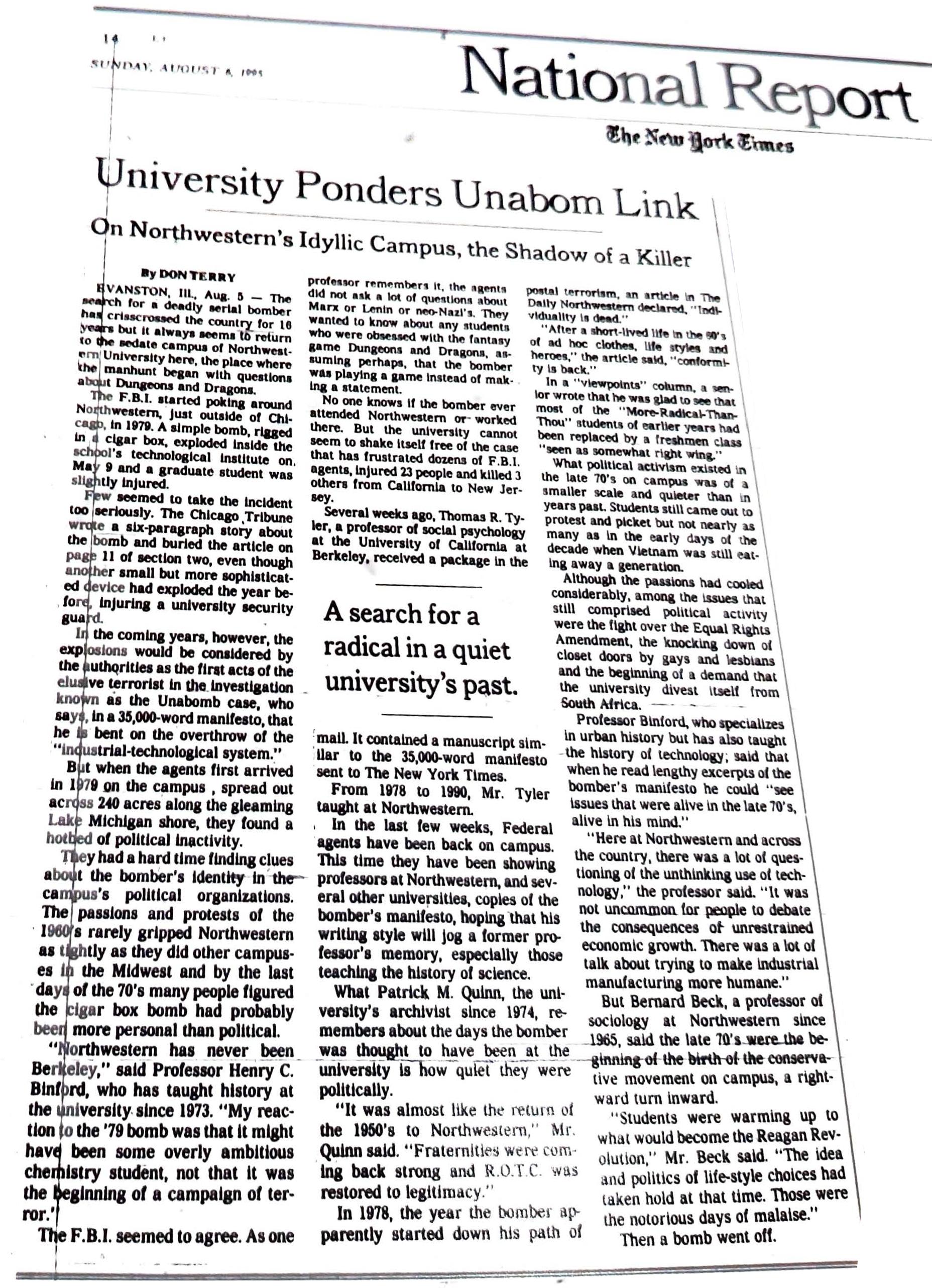Don Terry
University Ponders Unabom Link
On Northwestern's Idyllic Campus, the Shadow of a Killer. A search for a radical in a quiet university's past.
Evanston Ill., Aug. 5 -- The search for a deadly serial bomber has crisscrossed the country for 16 years but it always seems to return to the sedate campus of Northwestern University here, the place where the manhunt began with questions about Dungeons and Dragons.
The F.B.I. started poking around Northwestern, just outside of Chicago, in 1979. A simple bomb, rigged in a cigar box, exploded inside the school's technological institute on May 9 and a graduate student was slightly injured.
Few seemed to take the incident too seriously. The Chicago Tribune wrote a six-paragraph story about the bomb and buried the article on page 11 of section two, even though another small but more sophisticated device had exploded the year before, injuring a university security guard.
In the coming years, however, the explosions would be considered by the authorities as the first acts of the elusive terrorist in the investigation known as the Unabomb case, who says, in a 35,000-word manifesto, that he is bent on the overthrow of the "industrial-technological system."
But when the agents first arrived in 1979 on the campus , spread out across 240 acres along the gleaming Lake Michigan shore, they found a hotbed of political inactivity.
They had a hard time finding clues about the bomber's identity in the campus's political organizations. The passions and protests of the 1960's rarely gripped Northwestern as tightly as they did other campuses in the Midwest and by the last days of the 70's many people figured the cigar box bomb had probably been more personal than political.
"Northwestern has never been Berkeley," said Professor Henry C. Binford, who has taught history at the university since 1973. "My reaction to the '79 bomb was that it might have been some overly ambitious chemistry student, not that it was the beginning of a campaign of terror."
The F.B.I. seemed to agree. As one professor remembers it, the agents did not ask a lot of questions about Marx or Lenin or neo-Nazi's. They wanted to know about any students who were obsessed with the fantasy game Dungeons and Dragons, assuming perhaps, that the bomber was playing a game instead of making a statement.
No one knows if the bomber ever attended Northwestern or worked there. But the university cannot seem to shake itself free of the case that has frustrated dozens of F.B.I. agents, injured 23 people and killed 3 others from California to New Jersey.
Several weeks ago, Thomas R. Tyler, a professor of social psychology at the University of California at Berkeley, received a package in the mail. It contained a manuscript similar to the 35,000-word manifesto sent to The New York Times.
From 1978 to 1990, Mr. Tyler taught at Northwestern.
In the last few weeks, Federal agents have been back on campus. This time they have been showing professors at Northwestern, and several other universities, copies of the bomber's manifesto, hoping that his writing style will jog a former professor's memory, especially those teaching the history of science.
What Patrick M. Quinn, the university's archivist since 1974, remembers about the days the bomber was thought to have been at the university is how quiet they were politically.
"It was almost like the return of the 1950's to Northwestern," Mr. Quinn said. "Fraternities were coming back strong and R.O.T.C. was restored to legitimacy."
In 1978, the year the bomber apparently started down his path of postal terrorism, an article in The Daily Northwestern declared, "Individuality is dead."
"After a short-lived life in the 60's of ad hoc clothes, life styles and heroes," the article said, "conformity is back."
In a "viewpoints" column, a senior wrote that he was glad to see that most of the "More-Radical-Than-Thou" students of earlier years had been replaced by a freshmen class "seen as somewhat right wing."
What political activism existed in the late 70's on campus was of a smaller scale and quieter than in years past. Students still came out to protest and picket but not nearly as many as in the early days of the decade when Vietnam was still eating away a generation.
Although the passions had cooled considerably, among the issues that still comprised political activity were the fight over the Equal Rights Amendment, the knocking down of closet doors by gays and lesbians and the beginning of a demand that the university divest itself from South Africa.
Professor Binford, who specializes in urban history but has also taught the history of technology, said that when he read lengthy excerpts of the bomber's manifesto he could "see issues that were alive in the late 70's, alive in his mind."
"Here at Northwestern and across the country, there was a lot of questioning of the unthinking use of technology," the professor said. "It was not uncommon for people to debate the consequences of unrestrained economic growth. There was a lot of talk about trying to make industrial manufacturing more humane."
But Bernard Beck, a professor of sociology at Northwestern since 1965, said the late 70's were the beginning of the birth of the conservative movement on campus, a rightward turn inward.
"Students were warming up to what would become the Reagan Revolution," Mr. Beck said. "The idea and politics of life-style choices had taken hold at that time. Those were the notorious days of malaise."
Then a bomb went off.

